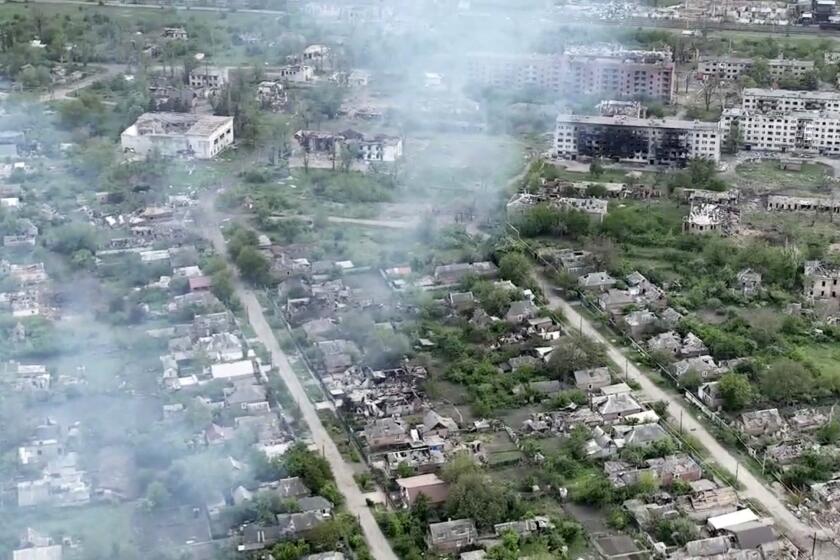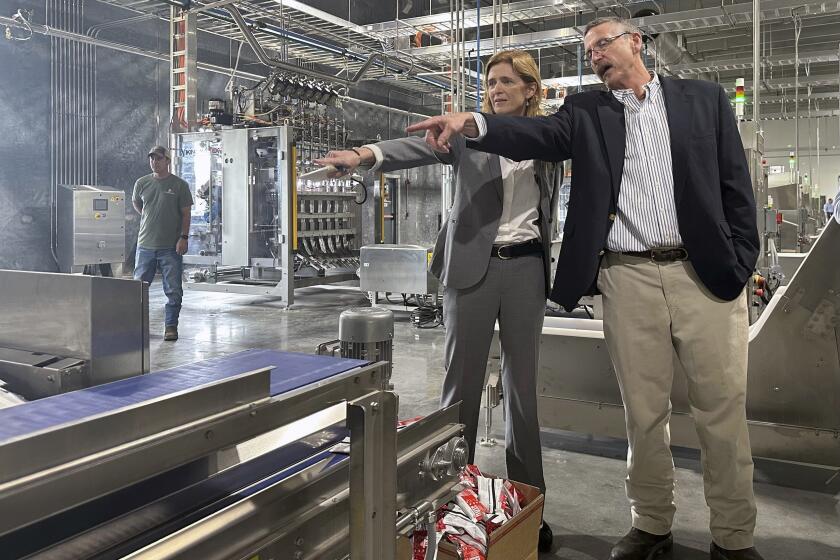Gorbachev Puts Brakes on Pace of His Reforms : NEWS ANALYSIS
Even as he consolidated his personal power, Soviet President Mikhail S. Gorbachev has recently put brakes on the pace of reform and even back-tracked on some aspects of perestroika , according to American analysts.
“We seem to be entering a new period in which Gorbachev sees the need to rein in the more radical forces in society,” said Mark Zlotnik, a senior analyst of the CIA. “Now that the conservatives (on the ruling Politburo) have been vanquished, he needs to put the brakes on.”
The changes reflect the underlying precariousness of the situation in the Soviet Union, and most analysts see Gorbachev’s moves as tactical efforts to dampen the tremors that his reforms have already triggered, not a basic shift away from restructuring the country.
But in times of chaos, the distinction between tactical and strategic moves can disappear: Short-term moves sometimes develop momentum toward strategic retreat, several government experts warned.
“He is responding to the growing chaos, trying to tighten up, to accommodate to social forces that are getting beyond control, to get some stability and order into the country,” said Arnold Horelick, a former CIA official who now heads the RAND-UCLA Soviet study center.
“His recent moves are reactive now,” said one senior U.S. expert, “but I’m sure he can’t tell you from month to month where he’s going.”
Any change of direction is watched carefully by U.S. analysts for signs that a basic reversal of the reform process is beginning. Skeptics still fear that Gorbachev’s political, economic and social reforms will someday be reversed--by him or by successors--and that the confrontational policies of the Cold War might reappear.
In the past few weeks, Gorbachev has:
-- Endorsed a bill banning strikes, which have become common vehicles for political as well as economic protest.
-- Called for “greater discipline” within the Communist Party, which he insisted will not relinquish its political and ideological positions even though its entrenched bureaucracy remains the main roadblock to perestroika.
-- Demanded stronger internal security forces such as the new riot police who, armed with a powerful new tear gas and truncheons, bloodily suppressed a nationalist demonstration in the Ukrainian city of Lvov.
-- Supported new laws on a mixed economy that fall far short of the reforms many Soviets, and many American economists, feel are necessary. Instead of private ownership, for example, the new laws provide only for the leasing and renting of state-owned property by private citizens.
-- Endorsed the fierce attack by the Kremlin on the nationalist movements, particularly in the Baltic states, as “adventurist” when they seek independence. He did, however, meet privately with Communist Party leaders from those states, reportedly promising them considerable autonomy but urging their united opposition to secession.
All this, said one former government analyst, adds up to “a swing to the right, undoubtedly.”
In the view of this analyst, Gorbachev’s actions represent not a fundamental move away from reforms but only tactical maneuvering.
‘Another Lurch to the Left’
“I think it’s in preparation for another lurch to the left” with more radical reforms, the analyst said.
Secretary of State James A. Baker III seems inclined to the same view. Baker told a Senate hearing last week that Gorbachev repeatedly turns economic setbacks into political advances, as he did in September when he ousted three members from the ruling Politburo who were considered his most conservative opponents.
“Gorbachev has not been deterred by the failure to produce economic results,” Baker said. “To the contrary, at least so far, his recourse when facing obstacles, as we saw once again this summer, is to use problems to further consolidate his authority. Then he takes (new) steps to press political and economic reforms further.
“He doesn’t fold, he doesn’t call, he simply raises the stakes,” Baker said.
The majority of Soviet specialists, both in and out of government, also see Gorbachev’s recent moves as a tactical rather than a strategic retreat. But most are reluctant to predict whether another giant step forward will follow.
‘Stronger, More Indispensable’
“It’s paradoxical,” said Horelick, “that because the situation in that country is so bad, Gorbachev becomes personally stronger and more indispensable.
“Gorbachev is temporarily backtracking, taking stock and adopting stabilizing measures,” said Zlotnik in offering his personal views, rather than an official U.S. assessment, at a public seminar at the Smithsonian’s Kennan Institute.
The widespread discussion of the dangers of anarchy, coups and civil war in Moscow has forced Gorbachev to address these possibilities, if only to dismiss them. But for him even to discuss them publicly, according to Zlotnik, indicates that “the situation is measurably more acute now than when (Nikita S.) Khrushchev was overthrown” in 1964.
Gorbachev’s position appears stronger within the Politburo after last month’s Central Committee meeting. But his opposition has long been concentrated in the party’s Central Committee and in the party rank-and-file rather than the Politburo.
He has been trying to shift power to the embryonic legislature, as an alternative to the party. This would provided him with an alternate base of support. Now he is Soviet leader because he is general secretary of the party, but in the future, his other role as the Soviet president may become more powerful if the legislature does take over power from the party.
Viable Counterweight
In this respect, he probably won a little ground by accident last week. The Supreme Soviet forced him to accept less than the 15-month strike ban, but in the process showed itself capable of becoming much more than the rubber-stamp legislatures of the past. A stronger Supreme Soviet, while more difficult to manage, is a potentially viable counterweight to the party bureaucracy.
Gorbachev today seems secure, mainly because no credible alternative to him exists. “Although the crisis is deepening under his leadership,” Horelick said, “his opposition recognizes that the situation is so delicate that even to contemplate a change now would be very destabilizing.”
The next dangerous period for him is likely in mid-winter, when economic and nationalist pressures may erupt at the same time. A major fuel shortage for homes and factories, for example, might coincide with the new elections, between December and February, for the top jobs in the 15 republics, numerous regions, and local communities. These elections could bring to power outspoken nationalists in the Baltic states and even the Ukraine--leaders intent on greater independence than the Kremlin will tolerate.
Riots could take place that would have to be brutally suppressed, as Chinese authorities dealt with demonstrators in Beijing last June, some scholars have theorized. A substantial retrenchment of Gorbachev’s reform program would occur, perhaps going so far as Gorbachev’s replacement by the moderate-centrist faction of the Politburo now building around Prime Minister Nikolai I. Ryzhkov.
Among the most fearful outcomes that might follow--sparked by uprisings in the Baltics or East European nations deserting the Warsaw Pact, for example--could be a backlash regime, built upon Russian nationalism, that would be reactionary, repressive and militant, some observers say.
Some scholars have called this possible result “Red fascism.”
More to Read
Start your day right
Sign up for Essential California for news, features and recommendations from the L.A. Times and beyond in your inbox six days a week.
You may occasionally receive promotional content from the Los Angeles Times.





